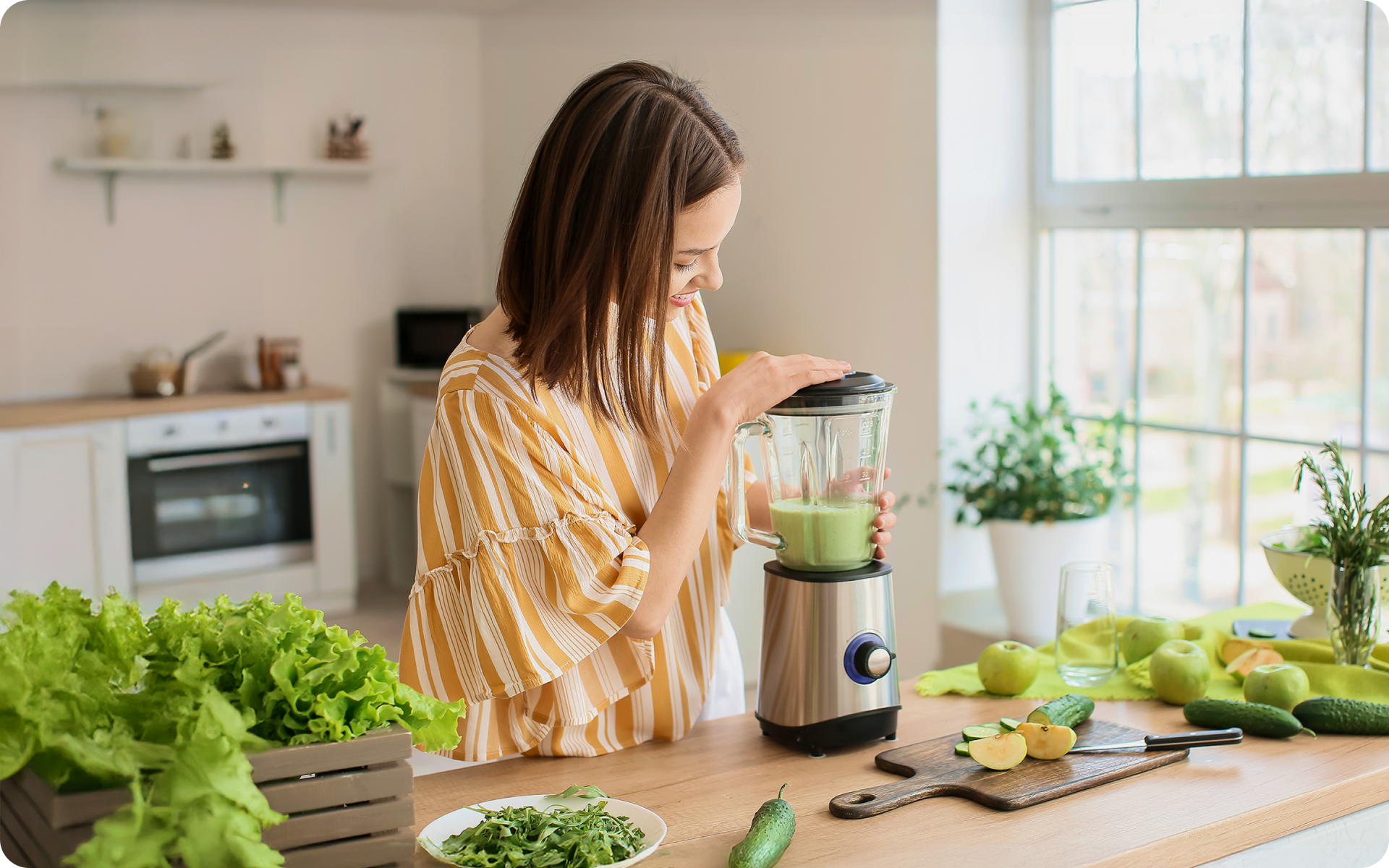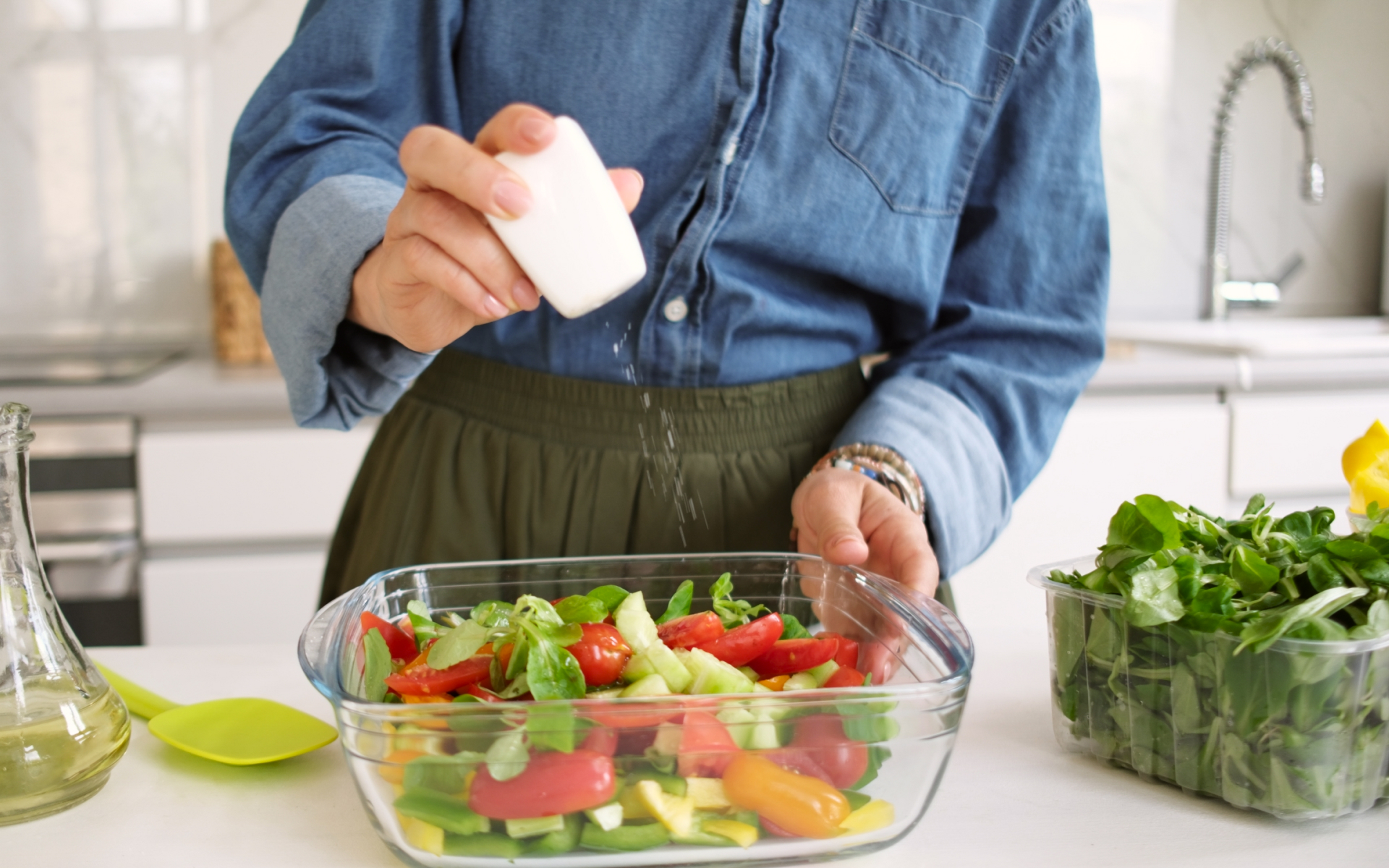Picture this: you’ve just completed a fast (whether it’s 12 hours, 24 hours, or even 3 days long). You’re obviously really hungry and craving that piece of cake in the fridge that’s been on your mind ever since you started fasting. Your first thought will most likely be, “I’ve done well fasting, the least I could do is reward myself with a piece of cake!”
In all honesty, this is the last thing you should do! Not only would eating this piece of cake cancel out the healthy benefits of fasting, it would also cause some digestive issues such as bloating and acidity. We bet you don’t want that, do you?
So, now that cake is definitely out of the question, what are the best foods to break a fast?
Truth be told, it is quite easy to go back to your detrimental eating habits after a long period of fasting (5). And the worst part of all is the realization that the job is not yet done, even after having completed the fast successfully.
The stress of deciding the best foods to break a fast can be all too much. There are many theories or suggestions regarding what foods are best to break a fast, but the bottom line is this – whatever foods you choose, they should be easily digestible and devoid of excessive carbs and sugars. But what are these foods exactly? Which are the best foods to break a fast?
Before we dive into it, let’s take a quick look at how fasting helps the human body and why it matters to break it with the right foods.
What is fasting and how does it benefit the body?
For centuries, people have fasted for a variety of different reasons: survival, spiritual, religious, diagnostic, ethical, and weight management.
Essentially, fasting is abstention from eating and on certain occasions, from drinking too. It can be done for various lengths of time, i.e. 12 hours, 24 hours, or even 2-3 days. However, the impact it has on an individual’s metabolism differs due to different factors such as age, gender, medical history, and body fat percentage. (8)
The belief stems from the understanding that fasting will help improve your overall health, eliminate toxins from the body, and aid in mental well-being.
Research and studies have proven fasting to help with the following:
- Lower blood pressure
- Reduced inflammation
- Improved cognitive function
- Prevention or lowered risk for certain cancers
- Improved insulin resistance (6)
According to a 2015 study, evidence suggests that intermittent fasting could have benefits for weight loss and chronic disease prevention. The authors suggested that this may be due to the effects of fasting on circadian rhythms, gut microbiota, and metabolic regulation. (7)
Other sources indicate that health benefits may be due to metabolic switching, where fasting triggers the body to switch its source of energy from glucose to fats and ketones. The production of ketones, or ketogenesis, consequently has beneficial effects for health and aging. (10)
Whether you’re a workout beast or just a beginner making your first foray into the world of fitness and dieting – BetterMe has a lot to offer to both newbies and experts! Install the app and experience the versatility first-hand!
Does it matter what you eat after fasting?
The crucial aspect of fasting involves limiting your energy intake on specific days or during certain hours, which prompts metabolic switching to fat and ketones. When you resume eating, glucose levels rise, and the body shifts towards using carbohydrates as fuel. Therefore, what you consume during fasting matters more than your post-fast meal. For weight loss, opting for fewer refined carbohydrates during the break is advisable, as research has indicated their link to obesity. (14)
Now that we know breaking a fast is equally as important as keeping one, let’s take a look at the best foods to break a long fast with.
Best Foods to Break a Fast: Top Foods That Will Make the Transition From Fasting Easy
Some of the best foods to consume when breaking a fast include:
Bone broth
Does bone broth break a fast? Yes, it does. In fact, bone broth is one of the number one foods you should consider when thinking of what to eat to break a fast.
- This is because bone broth contains an abundance of electrolytes, which when consumed help replace the ones that were lost during fasting.
- It is rich in magnesium, sodium, calcium, and potassium, which are all desirable for a healthy body.
- Furthermore, bone broths contain protein and are also easily digestible, which makes them the best choice when breaking a fast.
One point to note is that when breaking a fast, it is helpful to opt for bone broths that contain healthy protein and carbs, but you need to make sure the carbs are easily digestible, such as pasta, lentils, or tofu.
Similarly, you should avoid bone broths that contain heavy cream, high-fiber, and raw vegetables, as this can be a lot for your digestive system to handle right away.
Apple cider vinegar diluted in water
Many people all over the world cannot stop raving about the health benefits of apple cider vinegar, and rightfully so. Some of them include:
- Improve insulin function
- Lower blood sugar levels after meals
- Aid with weight loss (1)
One of the reasons why this vinegar is loved by so many is that it can be a great choice when breaking a fast.
Simply add one to two tablespoons of the vinegar to water and drink the mixture. The apple cider vinegar in the water will help stimulate the digestive tract, which was dormant during fasting.
In addition, some people believe that it makes you feel fuller once you begin eating again and that it improves the digestion of your first meal.
Read more: Intermittent Fasting Meals That Will Fit Your 16/8 Schedule
Spinach or kale
These green leafy vegetables contain enormous amounts of nutrients and minerals. Their benefits include:
- They contain vitamins C, B2, B6, E, A, and K, in addition to magnesium, iron, copper, potassium, calcium, folate, and manganese. The health benefits of these nutrients should not be underestimated.
- These leafy vegetables also help with digestion and prevent constipation, which are two of the biggest worries among people who fast.
- Furthermore, kale and spinach also help maintain blood sugar, which is affected by fasting.
You may want to cook them if you are going to consume these leafy greens in your first meal after a fast, as this will make them easier to digest.
Fish
Fish is a great source of protein, vitamin D, and healthy fats. For this reason, fish should definitely be on your list of the best foods to break a fast. If eating fish straight away might be too much for you, you could try starting with fish broth.
Eggs
Eggs are one of the most readily available and most convenient sources of protein. They also contain a lot of the aforementioned protein, which makes them the number one choice among many dieters.
- The protein in eggs is helpful when breaking a fast as it helps prevent the loss of muscle. So, if your goal is to lose fat and gain muscle, you should definitely consider eating some eggs when breaking your fast.
- Eggs are also rich in leucine, an amino acid that is lauded for its role in muscle growth.
- They are easily digestible, low in calories, and protein-rich, and the fact that they are so filling reduces your appetite.
Nuts
Nuts are great as they are vitamin-rich and help restore nutrient balance in the body following a fast.
Chia seeds
- Chia seeds contain phosphorus, copper, magnesium, iron, and selenium, which makes them great to consume when breaking a fast.
- They are also rich in healthy fats, proteins, and fats the body needs to replenish itself after not getting food for a while.
Broccoli or cauliflower
Cooked broccoli and cauliflower are good options for breaking a fast. These vegetables contain vitamins C, B6, B2, K, B5, B9, and A and iron, magnesium, and manganese.
Make sure you cook them before you consume them to make them easier to digest.
Watermelon
As watermelons are made up of over 90% water, they are great fruits to consume when breaking a fast as the water makes them easy to digest and helps hydrate you.
Bananas
Despite their high sugar and carb content, these nutrient-packed fruits make for the best foods to eat when breaking a fast. They contain healthy carbohydrates, fiber, vitamins, and minerals that will quickly replenish your body.
However, it is important to note that the high-sugar and high-carb content of bananas make them a less suitable choice for breaking an extended fast, as they may lead to blood sugar spikes.
If you choose to break your fast with a banana, eat it with something that is rich in protein and healthy fat (such as nut butter) as this will slow down digestion and absorption of the entire meal.
Fermented foods such as unsweetened yogurt
Fermented foods such as yogurt, kimchi, and sauerkraut contain good gut bacteria. This means that when they are consumed, they provide the gut with good bacteria and enzymes that help with the entire digestive process.
The probiotics in yogurt also make it an easy food to digest.
Smoothies
If you want to ease into eating again, then you should try consuming a smoothie rather than whole fruits and vegetables. This is because smoothies contain less fiber and are more gentle on the digestive system.
Dried fruits
Dried fruits such as dates, apricots, and raisins contain large amounts of nutrients, which is why they should be on your list (13). They contain some natural sugar, so have them as part of a meal that also contains protein and healthy fat to slow down absorption.
Avocado
Despite being looked down upon by some for being a fatty fruit, avocados may be the best choice for someone who’s breaking a fast. They are low in calories and rich in healthy fats, antioxidants, vitamins, minerals, folate, potassium, and copper.
The bottom line is that you should avoid foods that contain large amounts of sugar, complex carbs, fiber, and fat when breaking a fast.
Best Foods to Break a 16-Hour Fast
When breaking a 16-hour fast, you can consume any of the aforementioned foods in moderation. Your first meal should be no more than 500 kcal or 50% of your normal intake.
You should also ensure that you consume whole foods and a mix of macronutrients to replenish your body.
Another tip is to avoid carb-loaded meals and sugary beverages as they will cause a spike in your blood sugar levels and make fasting for the next period even harder, as your hunger hormones will be raised.
Dropping pounds by the dozens without putting yourself through the wringer is everyone’s weight loss pipe dream. But what if we told you that the BetterMe app can make that happen? Keep yourself in prime shape with our fat-blasting workouts, delicious budget-sparing recipes, and body-transforming challenges with our app!
Best Foods to Break a 24-Hour Fast
If you’re wondering what to eat following a 24-hour fast, the same foods also work well for this duration.
Best Foods to Break a Fast Keto
The good thing is that most of the foods mentioned above are keto-friendly, so you can safely consume them when breaking a fast while still maintaining ketosis.
Best Foods to Break a 3-Day Fast
Some tips you should remember for extended periods of fasting include:
- Avoid excessive carbohydrates and sugar
- Consume easily digestible foods in small portions
- Consume nourishing soups and bone broths that contain cooked vegetables and easy-to-digest proteins such as fish and poultry
For a longer fast, it may also be wise to avoid the following foods:
- Dairy products
- Alcohol
- Red meat
- Seeds and seed butter
- Nut and nut butter
- Raw cruciferous vegetables
It should also be noted that breaking an extended fast may cause you to experience the following:
- Gas pain
- Nausea
- Diarrhea or loose stools
- Passing of undigested foods
To avoid or minimize these side effects when breaking an extended fast, you may want to consider shortening the length of your fast (15).
How Do You Break a Fast?
As was previously mentioned, you should avoid high-carb, high-sugar foods when breaking a fast. It is also advised that you opt for easily digestible foods that won’t give your body a hard time.
You should remember that normally (when not fasting), our bodies use up metabolic energy to produce digestive enzymes and juices in order to break down the food we consume. However, when fasting, these digestive enzymes and juices are no longer produced as they are not required.
This means that when fasting, our bodies are devoid of digestive enzymes and juices. Therefore, we must be careful when breaking a fast as it will take some time before the body produces these necessary chemicals, meaning that the food you eat to break a fast can sit in your stomach for a while before it is processed (11).
To help the body during this process, it is recommended that you consume food that is easily digestible.
Other helpful tips when breaking a fast include:
Ensure that you start by drinking some water.
- Ensure that you start by drinking some water.
- You should consume protein such as poultry and fish, as they are more easily digestible than red meat.
- Opt for small portions of foods that are easily digestible to avoid overwhelming the body.
How Many Calories Break a Fast?
It is recommended that the meal you eat to break a fast is 500 Kcal or 50% of your regular calorie intake at most.
What Can I Drink When Fasting?
There are several drinks you can consume when fasting to avoid breaking the fast. They include:
- Water
- Sparkling water
- Unsweetened tea and coffee
- Diluted apple cider vinegar – may break the fast
- Certain vitamins and supplements
Foods to Avoid When Breaking a Fast
Some of the worst foods to break a fast with include:
- Raw cruciferous vegetables, as they contain a lot of fiber that may make digestion difficult. In fact, cruciferous vegetables are known to contain a trisaccharide called raffinose that is difficult to digest.
- Alcohol – it is best to avoid alcohol when coming out of a fast, particularly one that has lasted for three days or more. This is because the overconsumption of alcohol can cause ketoacidosis, a situation where ketones are very high in the blood while the blood glucose level is dangerously low. Symptoms of ketoacidosis include abdominal pain and vomiting. While the condition is common in alcohol addicts and people who have an over-dependence on alcohol, it is also likely that people who do not eat enough or those who fast then consume a lot of alcohol with little to no food intake may suffer from ketoacidosis (2, 3, 4).
- Processed and high-glycemic carbohydrates.
- Foods that contain lactose, as this can be difficult to digest.
Read more: 4 Keto Quiche Recipes for a Savory Breakfast
What Is Refeeding Syndrome and How Can You Avoid It?
Refeeding syndrome refers to the potentially deadly changes in the fluids and electrolytes that can occur in malnourished individuals (9, 12).
But what does refeeding syndrome have to do with fasting and breaking a fast? Well, it is one of the side effects of resuming food consumption following a long period of not eating or malnutrition.
When you start eating again after a long period of not eating or malnourishment, cortisol, insulin, and noradrenaline are suddenly reactivated in the body. This then causes the movement of major intracellular ions such as calcium, potassium, and phosphorus into the cells of the body.
As the body cells have not been receiving these ions, this movement becomes excessive, which leads to an insufficiency of these ions in the blood.
Refeeding syndrome is generally characterized by:
- Hypophosphatemia, which means having very low phosphorus levels in the blood.
- Low levels of potassium, calcium, and magnesium in the blood.
- The syndrome subsequently causes heart abnormalities, respiratory problems, cardiac failure, convulsions, and even comas.
- Refeeding syndrome may cause confusion, weakness, malaise, seizures, high blood pressure, difficulty or inability to breathe, heart failure, heart arrhythmias, comas, and even death. These symptoms generally appear two to four days after the start of the refeeding.
To avoid refeeding syndrome:
- Avoid consuming high-carb foods when breaking a fast
- Always consult a physician before you start a fast and follow their advice
- Stay hydrated when fasting
- Take supplements when fasting
Summary
You may think that fasting is the difficult part of it all, but the stress that comes with choosing the best foods to break a fast can be more than you may imagine.
When breaking a fast, your focus should be on easy-to-digest foods that won’t overwhelm your body. It’s important to remember that your body has spent some time not digesting anything, so you will want to ease it back into the digestive process.
Some of the best foods to consume when breaking a fast include diluted apple cider vinegar, bone broth, spinach, kale, eggs, fish, nuts, chia seeds, dried fruits, cooked broccoli, cooked cauliflower, watermelon, bananas, and fermented foods such as unsweetened yogurt.
These foods are easy to digest and are also rich in nutrients and electrolytes, which is why consuming them when breaking a fast will help replenish the nutrients and electrolytes you have lost during fasting.
Similarly, there are some foods you should avoid like the plague when breaking a fast. These include alcohol, dairy products (for those with lactose intolerance), raw cruciferous vegetables, and processed and high-glycemic carbohydrates.
It should also be noted that the meal you consume to break a fast should be at most 500 kcal or 50% of your regular calorie intake.
FAQs
How do you break a fast properly?
Breaking a fast is a crucial process that requires mindful consideration for optimal physiological response.
You should follow the below guidelines for correctly breaking a fast.
- Hydration: Start breaking the fast with adequate hydration in order to replenish fluids lost during fasting.
- Nutrient-Dense Meal: Consume a balanced meal that is rich in:
- Lean proteins
- Whole grains
- Fruits and vegetables
- Glycogen Replenishment: Prioritize foods that help replenish glycogen stores and support energy levels.
- Healthy Fats: Incorporate sources such as avocados or olive oil for sustained energy release.
- Gradual Reintroduction: Reintroduce food gradually rather than eating large meals to prevent digestive discomfort.
- Avoid Refined Carbs: Research suggests avoiding refined carbohydrates and sugars to regulate blood sugar levels.
- Customization: Tailor the post-fast meal to your individual dietary preferences and health goals for a balanced transition back to regular eating patterns.
What should you not eat after fasting?
To ease the process of reintroduction to food, certain foods should be avoided when breaking a fast. Some things you need to consider are:
- Avoid Refined Carbs and Sugars: Steer clear of processed foods that are high in refined carbohydrates and sugars to maintain stable blood sugar levels.
- Limit Heavy, Greasy Foods: Minimize your intake of heavy, greasy foods to prevent indigestion and acidity.
- Skip Large Meals: Opt for smaller, frequent meals rather than large portions to ease the digestive process.
- Delay High-Intensity Spices: Postpone the consumption of overly spicy foods to prevent potential digestive irritation.
- Wait with Alcohol Consumption: Limit your alcohol intake initially to prevent abrupt reactions and prioritize hydration instead.
Personalize Based on Sensitivities: Tailor your choices based on individual sensitivities or dietary restrictions for a smoother transition.
Can I eat rice after fasting?
Certainly. After fasting, incorporating rice into your post-fast meal is a good option. Opt for whole grain varieties for added nutrients and fiber. Ensure a balanced meal with proteins and vegetables to support sustained energy release and avoid abrupt blood sugar level spikes.
Can I eat a banana after fasting?
Despite their sugar and carb content, bananas are nutrient-rich and ideal for breaking a fast. They are packed with healthy carbs, fiber, vitamins, and minerals and will swiftly replenish the body.
However, due to their high sugar and carb levels, it is recommended to pair them with protein and healthy fats such as nut butter to mitigate blood sugar spikes during an extended fast.
In addition, some factors you should consider when opting for a banana should include:
- Bananas are an excellent choice post-fast due to their natural sugars that provide a quick energy boost.
- Bananas contain essential nutrients such as potassium, vitamin C, and vitamin B6, which help replenish electrolytes and support overall health.
- Their easily digestible nature makes them gentle on the stomach, which minimizes the risk of digestive discomfort.
- While bananas are nutritious, moderation is advised to ensure a balanced intake of various nutrients is maintained.
The Bottom Line
There are many health benefits that are associated with fasting and one of them is the potential loss of weight. Although the fasting part is important, what you eat to break the fast is even more crucial. Depending on the foods you consume immediately after fasting, you may either cancel out the beneficial effects of the fast or supplement them.
Therefore, it is recommended that everyone who goes on a fast does thorough research on the best foods to break a fast. There are various restrictions regarding what you can or cannot eat when breaking a fast, but the foods must be easily digestible, and high-carb, high-sugar foods are out of the question.
DISCLAIMER:
This article is intended for general informational purposes only and does not serve to address individual circumstances. It is not a substitute for professional advice or help and should not be relied on for making any kind of decision-making. Any action taken as a direct or indirect result of the information in this article is entirely at your own risk and is your sole responsibility.
BetterMe, its content staff, and its medical advisors accept no responsibility for inaccuracies, errors, misstatements, inconsistencies, or omissions and specifically disclaim any liability, loss or risk, personal, professional or otherwise, which may be incurred as a consequence, directly or indirectly, of the use and/or application of any content.
You should always seek the advice of your physician or other qualified health provider with any questions you may have regarding a medical condition or your specific situation. Never disregard professional medical advice or delay seeking it because of BetterMe content. If you suspect or think you may have a medical emergency, call your doctor.
SOURCES
- 6 Health Benefits of Apple Cider Vinegar ( 2023, healthline.com)
- Alcoholic ketoacidosis (2006, ncbi.nlm.nih.gov)
- Alcoholic Ketoacidosis (2020, emedicine.medscape.com)
- Alcoholic ketoacidosis: a case report and review of the literature (2016, ncbi.nlm.nih.gov)
- Fasting: Health benefits and risks (2015, medicalnewstoday.com)
- Fasting: What Foods Won’t Break a Fast? ( 2023, healthnews.com)
- Intermittent Fasting And Human Metabolic Health (2015, ncbi.nlm.nih.gov)
- Physiology, Fasting ( 2023, ncbi.nlm.nih.gov)
- Refeeding syndrome: what it is, and how to prevent and treat it (2008, ncbi.nlm.nih.gov)
- Research on intermittent fasting shows health benefits ( 2020, nia.nih.gov)
- The adaptation of digestive enzymes to the diet: its physiological significance (1980, pubmed.ncbi.nlm.nih.gov)
- The refeeding syndrome. Importance of phosphorus (2018, pubmed.ncbi.nlm.nih.gov)
- The unexpected truth about dates and hypoglycemia (2016, ncbi.nlm.nih.gov)
- What are the best foods to break a fast with? (2021, medicalnewstoday.com)
- What to know about 48-hour fasting (2020, medicalnewstoday.com)











